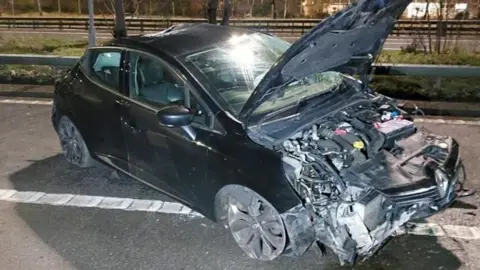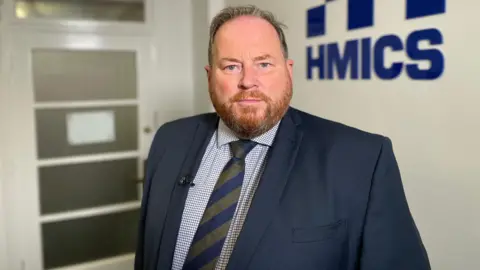Police watchdog warning amid rise in road casualties
 Police Scotland
Police ScotlandPolice Scotland is detecting significantly less crime on the country's roads despite increasing numbers of deaths and injuries.
A new report by His Majesty's Inspectorate of Constabulary in Scotland (HMICS) reveals there has been a 63% drop in recorded offences since 2013.
But the number of people killed or injured has increased each year since 2020 - and fatalities are already 26% higher than last year.
The force said it was already working to meet some of the watchdog's recommendations.
Last year, 155 people were killed on Scotland's roads, 1,930 were seriously injured and 3,703 people were slightly injured.
His Majesty's Inspectorate of Constabulary in Scotland, Craig Naylor, said: "The recent increases in road casualties are complex, and there is no single factor that has caused this trend.
"However, we are concerned that at a time when casualties are increasing, Police Scotland has decreased rather than increased its enforcement activity in this high-priority area."
The report said police activity to crack down on speeding, drink and drug-driving can help reduce tragedies.
And it also highlighted the vital role played by officers in combatting organised crime, such as the interception of cross-border drug consignments.

Mr Naylor urged Police Scotland - which replaced the old eight-force model in 2013 - to review its commitment to road policing.
His report praised the professionalism of the country's road policing officers, the force's leadership structure and the use of social media to promote key road safety messages.
But HMICS inspectors identified the drop in overall officer numbers as one factor impacting its ability to achieve its road safety goals.
Latest figures show officer numbers fell from 17,431 in March 2020 to 16,425 in October this year.
Of that total, 3.5% are dedicated to road policing.
 Police Scotland
Police ScotlandBrian Jones, vice-chair of the Scottish Police Federation (SPF), shared his concerns with HMICS as part of the review.
He told BBC Scotland News that the Scottish Borders used to have a dedicated pool of road traffic officers comprising of an inspector, three sergeants and 20 constables.
But Mr Jones said the same patch was now covered by six constables, supervised remotely by a sergeant.
And overall he said the number of officers covering the country's roads had decreased from 700 in 2013 to 500.
The former road policing sergeant added there had been a "significant migration" of resources from the south to the north of the country.
Mr Jones said: "If you see a reduction in visibility on the road network, especially strategic road network on a day-to-day basis, then driver behaviour will deteriorate.
"We'll see inappropriate driving behaviour, people using mobile phones, not wearing their seat belts, excessive speed, which have all been known for a long time to increase the likelihood of a collision."
'Dangerous practices'
HMICS inspectors said they were aware of a recent proposal by senior management - currently on hold - to focus only on day and late shifts rather than a 24-hour staffing model.
Mr Naylor also urged the force to make it easy for the public to report road traffic offences by directly uploading video clips rather than having to phone the force beforehand.
The report made 13 recommendations, including looking at ways to free up officers from court time through virtual appearances.
And it said the force should work with the Scottish government on a legislative change that would allow the escorting of abnormal loads to be carried out by an agency other than the police.
Adrian Simpson, head of policy at the Royal Society for the Prevention of Accidents (RoSPA), said sufficient resources were vital to support the goals of Scotland’s Road Safety Framework to 2030,
It sets out the vision for the country to have the best road safety performance in the world by the start of the next decade.
Mr Simpson added: "Due to rising casualty rates, we believe that visible, proactive road policing should remain a priority.
"Policing plays a vital role in promoting safer driving behaviours and deters dangerous practices."
Ch Supt Hilary Sloan, Police Scotland's head of road policing, said the force was already striving to meet some of the HMICS recommendations.
She said: “Road policing officers are out every day educating road users and carrying out enforcement.
"It is encouraging to see our work with road safety partners to embed crucial behaviour change recognised in this report."
She added Chief Constable Jo Farrell had been clear the service must evolve to meet demand.
Ch Supt Sloan said: "As part of this, we have outlined that we will identify and implement a sustainable model for road policing."
